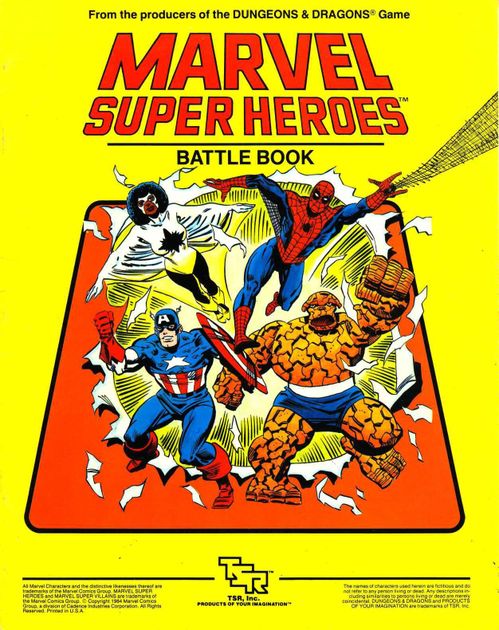We had a new person join us for the second open house, making us a group of four including myself.
Instead of continuing with our game of The Pool, we played one of my favorite out-of-print games -- Marvel Super Heroes Basic from 1984.
I had nothing prepared. In cases such as this, I like to choose a city that one least one person knows well and play in the modern day. Between that and the random character generation rules of this game in particular, I could prepare enough to play a few scenes and figure out the rest later if we decide to play again.
The players created two super heroes and a super villain who were based around Concordia University in Montreal. The two heroes are part of a university wrestling club that is a cover for a secret multi-generational super hero society that has a base of operations under the Norman Bethune monument in Montreal. The super villain was unconnected to this group, but they ended up cooperating with the heroes to defeat a threat (while still advancing their own agenda).
The threat in question first manifested as a poisonous pink gas cloud that emerged from a science experiment gone wrong in one of the buildings on the Loyola campus. The pink cloud is a sentient being, birthed by the experiment. It was trying to flee the site and accidentally poisoned occupants of the building while trying to get free. The heroes (and villain) co-operated in subduing the cloud, reasoning with it, and leading it to safety. The super villain deceived the other player characters at the end, leading the cloud back to their research lab to conduct experiments on it. That's where we left off.
I often joke that Marvel Super Heroes is weaponized for children due to its simplicity. It came about in the midst of the satanic panic, in a period where the publisher TSR was sanitizing Dungeons & Dragons to be less threatening to concerned parents and religious groups. They were producing coloring books, cartoons, and toys to better market it to children. As a result, Marvel Super Heroes looks very safe in its presentation and surface. (Abandonware copies can be easily found by an enterprising person with a search engine.) When I read it, and it is a joy to read, I see it speaking to two different audiences. The first is parents and people who want to play super heroes. The second is people who want to play villains.

The parent/hero text says: fight crime, and take care of your family and friends. The villain text says: rob banks, wreck stuff, recruit goons, and kidnap super heroes. But very interestingly: also take care of your friends and family. The penalties for failing to do so are even doubled for super villains. I will repeat that -- villains are held doubly accountable for failing to maintain their relationships with friends and family. Wow!
The game mechanics in play are far more enticing to me than something as crude as an alignment system. And like the comics of this era, they look like they are for kids, but end up being a great instrument for social commentary and exploring issues of morality.
The rules never actually say: players can be villains too, and it is fun! The villain rules are presented as guidelines for the GM. But when I read them, they look awfully player facing. It is surprising to me that more people haven't picked up on this cue and run with it.
I have run another game of Marvel Super Heroes for the last year where we have explored many of the implications of villain play. The premise for that game (titled Halfway Heroes) is that the characters would start on the day of their release from prison and that we would play through their experiences either re-entering society or returning to their criminal ways. That game taught me that villain play is very fun and just as profound as I hoped it would be. (A long series of posts and discussion about Halfway Heroes starts here.)
I am quite pleased that we saw some more villain play during this session. Villain play is a criminally underlooked and underplayed feature of this version of the game, which is also criminally underlooked and underplayed despite a long and continuing tradition of playing the later Advanced version and retro-clones such as FASERIP.
For the next open house, we could continue to play this game, or revisit our game of The Pool or even play something else. That's the promise of the open house -- show up and we will play something. I always have a few things that I can run. I also invite people to bring their own games (on the condition that they are willing to run them).
